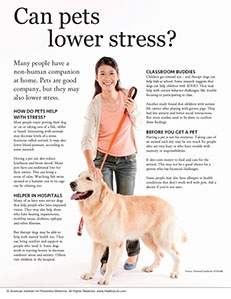SYMPTOM CHECKER
CONDITIONS
Male
Female
Child
Arm, Hand & Shoulder Concerns
Legs & Feet Concerns
Dental & Mouth Concerns
Ear & Nose
Eye Conditions
Head Conditions
Arm, Hand & Shoulder Concerns
Legs & Feet Concerns
Front
Back
Arm, Hand & Shoulder Concerns
Dental & Mouth Concerns
Ear & Nose
Eye Conditions
Head Conditions
Arm, Hand & Shoulder Concerns
Dental & Mouth Concerns
Ear & Nose
Eye Conditions
Head Conditions
Front
Back
Arm, Hand & Shoulder Concerns
Neck Links
Head & Neck Concerns
Arm, Hand & Shoulder Concerns
Neck Links
Head & Neck Concerns
Front
Back
Online Clinic
Wise Healthcare
Can pets lower stress?

Print on Demand
Many people have a non-human companion at home. Pets are good company, but they may also lower stress.
How do pets help with stress?
Most people enjoy petting their dog or cat or taking care of a fish, rabbit or lizard. Interacting with animals may decrease levels of a stress hormone called cortisol. It may also lower blood pressure, according to some research.
Having a pet can also reduce loneliness and boost mood. Many pets have unconditional love for their owner. This can bring a sense of calm. Watching fish swim around or a hamster run in its cage can be relaxing too.
Helper in hospitals
Many of us have seen service dogs that help people who have impaired vision. They may also help those who have hearing impairments, mobility issues, diabetes, epilepsy and other illnesses.
But therapy dogs may be able to help with mental health too. They can bring comfort and support to people who need it. Some dogs work in nursing homes to decrease residents’ stress and anxiety. Others visit children in the hospital.
Classroom buddies
Children get stressed too – and therapy dogs can help kids at school. Some research suggests that dogs can help children with ADHD. They may help with certain behavior challenges, like trouble focusing or participating in class.
Another study found that children with autism felt calmer after playing with guinea pigs. They had less anxiety and better social interactions. But more studies need to be done to confirm these findings.
Before you get a pet
Having a pet is not for everyone. Taking care of an animal each day may be too much for people who are very busy or who have trouble with memory or responsibilities.
It also costs money to feed and care for the animal. This may not be a good choice for a person who has financial challenges.
Some people may also have allergies or health conditions that don’t work well with pets. Ask a doctor if you’re not sure.
Source: National Institutes of Health
This website is not meant to substitute for expert medical advice or treatment. Follow your doctor’s or health care provider’s advice if it differs from what is given in this guide.
The American Institute for Preventive Medicine (AIPM) is not responsible for the availability or content of external sites, nor does AIPM endorse them. Also, it is the responsibility of the user to examine the copyright and licensing restrictions of external pages and to secure all necessary permission.
The content on this website is proprietary. You may not modify, copy, reproduce, republish, upload, post, transmit, or distribute, in any manner, the material on the website without the written permission of AIPM.
2021 © American Institute for Preventive Medicine - All Rights Reserved. Disclaimer | www.HealthyLife.com
















































